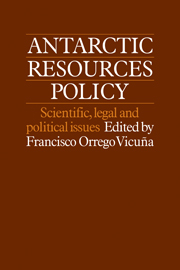Book contents
- Frontmatter
- Contents
- List of contributors
- 1 Antarctic resources policy: an introduction
- Part one The state of Antarctic knowledge and experience
- Part two The policy for the conservation of the living resources of Antarctica
- 7 Scientific and economic considerations relating to the conservation of marine living resources in Antarctica
- 8 The implementation of the Convention on the Conservation of Antarctic Marine Living Resources: needs and problems
- 9 The regime for the conservation of Antarctica's living resources
- 10 The Canberra Convention: objectives and political aspects of its negotiation
- Part three The policy for the exploration and exploitation of the mineral resources of Antarctica
- Part four Issues on Antarctica and the law of the sea
- Part five The policy for Antarctic cooperation
10 - The Canberra Convention: objectives and political aspects of its negotiation
Published online by Cambridge University Press: 06 July 2010
- Frontmatter
- Contents
- List of contributors
- 1 Antarctic resources policy: an introduction
- Part one The state of Antarctic knowledge and experience
- Part two The policy for the conservation of the living resources of Antarctica
- 7 Scientific and economic considerations relating to the conservation of marine living resources in Antarctica
- 8 The implementation of the Convention on the Conservation of Antarctic Marine Living Resources: needs and problems
- 9 The regime for the conservation of Antarctica's living resources
- 10 The Canberra Convention: objectives and political aspects of its negotiation
- Part three The policy for the exploration and exploitation of the mineral resources of Antarctica
- Part four Issues on Antarctica and the law of the sea
- Part five The policy for Antarctic cooperation
Summary
This article will approach the subject of the Convention for the Conservation of Antarctic Marine Living Resources from a legal and diplomatic viewpoint. Its scientific aspects, which are of singular importance, have been discussed in other chapters, and certainly fall outside my area of specialisation.
The Convention was adopted in Canberra, Australia, on 20 May 1980 and entered into force on 7 April 1982. It was the culmination of a process of environmental protection developed by the Consultative Parties of the Antarctic Treaty within the framework of the Antarctic System – a process to which a number of articles in this publication refer.
This Convention is of a very special importance because it represents the first occasion on which the Antarctic Treaty Consultative Parties, as such, have ventured into the realm of resources.
The system for Antarctic cooperation and resource policy
The Treaty says relatively little about the subject of Antarctica's resources; the topic is mentioned only once, in Article IX, when it refers to the powers and functions of the Consultative Parties as regards the protection of living resources. Apart from that reference, the Treaty maintains a silence which, in a sense, implies a moratorium on the subject. Indeed, as the Treaty struck a balance between the countries exercising or claiming sovereignty and those countries neither exercising, recognising nor disregarding it, and at the same time restricted some spheres of sovereign action (the renunciation of military uses, control of scientific research, etc.), the topic of resources – which is more controversial than the above issues from the standpoint of sovereignty – became the object, to a certain extent, of a political and legal moratorium.
- Type
- Chapter
- Information
- Antarctic Resources PolicyScientific, Legal and Political Issues, pp. 149 - 156Publisher: Cambridge University PressPrint publication year: 1983
- 2
- Cited by



